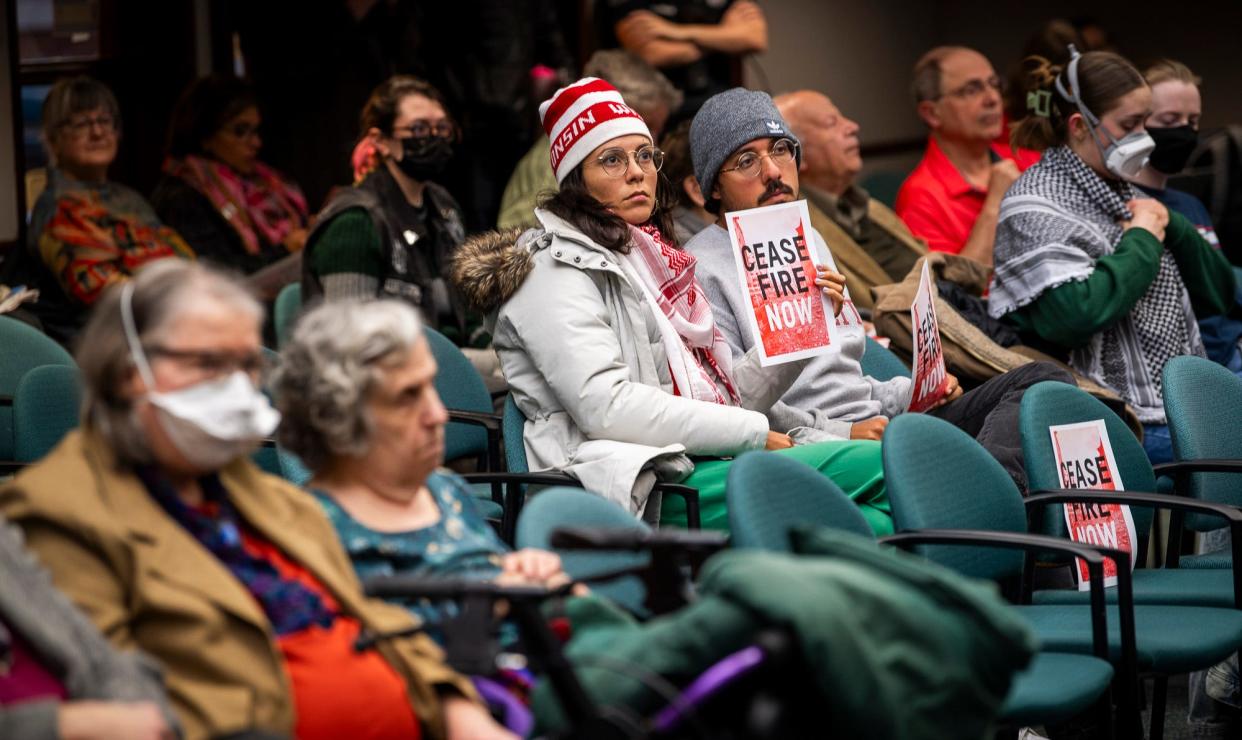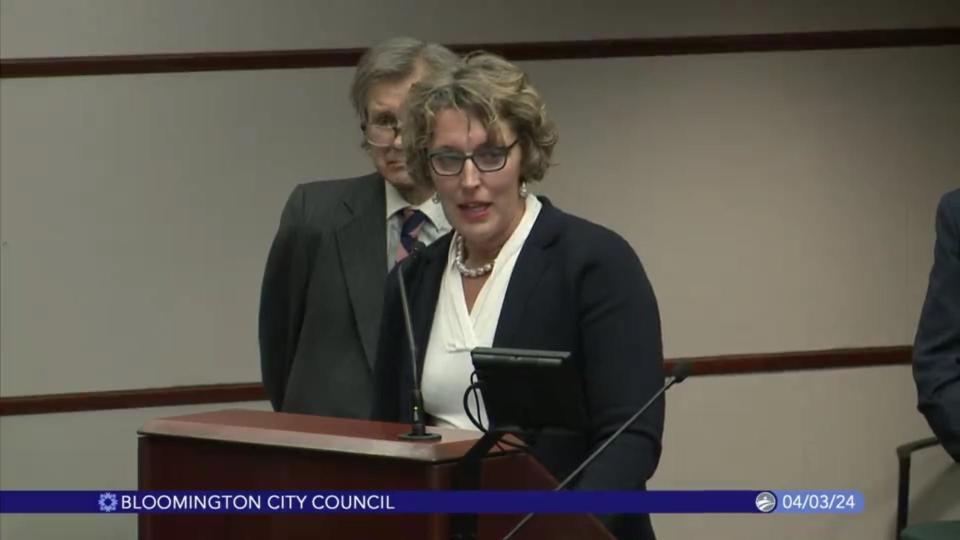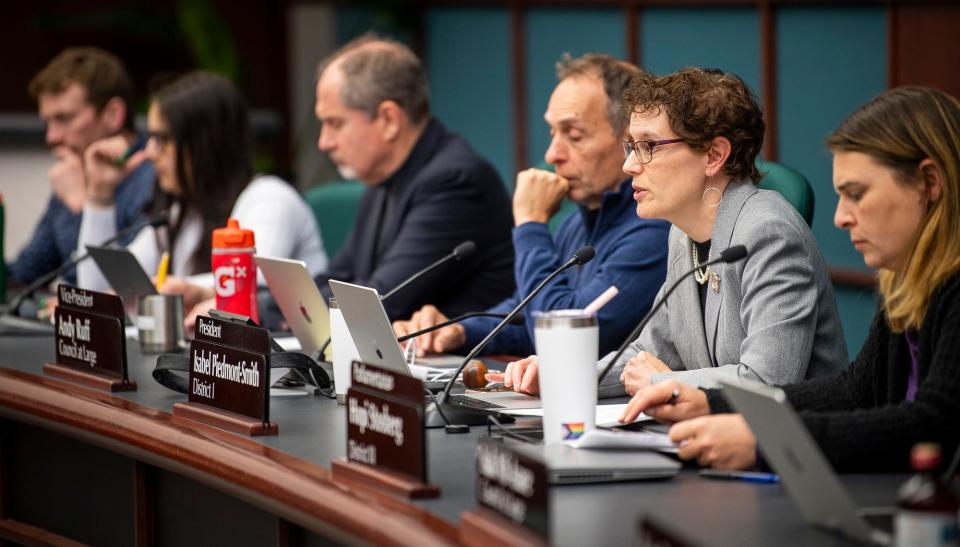Neo-Nazis co-opt Bloomington City Council meeting, leaving mayor 'furious,' in tears

Neo-Nazis co-opted last week’s Bloomington City Council meeting and, via Zoom, peddled antisemitic and racist speech.
The council Wednesday evening discussed, among other things, passing a resolution calling for a ceasefire in Gaza.
However, hours before discussion on the matter even began, neo-Nazis used the public comment period early in the meeting to spread white supremacist, racist, anti-LGBTQ and antisemitic tropes.
One speaker, who identified himself as Jim Adkisson, said, “I’ll take the label of Nazi if it means I love my people enough to stand against the genocide being perpetrated against us.” He also made derogatory comments about gay men and mixed-race children and ended his remarks with, "Heil Hitler," an infamous salute used by Nazis to venerate Adolf Hitler, the dictator of Nazi Germany under whom the Nazis murdered 6 million Jews.
A few minutes later, a speaker who identified himself as Jim Conley railed against diversity, equity and inclusion.
Minutes after that, another person peddled anti-immigrant and antisemitic conspiracy theories, ending his comment with, “White Power. Heil Hitler.” The comments drew boos from attendees in council chambers.
The three callers participated in the meeting via Zoom. Their identities could not be verified and it was unclear from where they called or whether they had a connection to Bloomington.
A speaker late in the meeting also peddled antisemitic tropes, disparaged Judaism and Jews and alleged they lie about the “holohoax,” an apparent attempt at downplaying or denying the Holocaust.
Bloomington mayor: 'Stand up and say something'
The early comments from the neo-Nazis prompted an unscheduled appearance at the meeting by Mayor Kerry Thomson, who fought tears as she urged residents to “stand up and say something” when confronted with hatred.

“I am sad and furious,” Thomson said, who had to pause for a few seconds to regain her composure.
“I’m here tonight to ask the people of Bloomington, when you hear hatred, when you hear Nazi speech, when you hear deliberate threats and condemnation of Black and brown people, you do not need to say something perfectly. Just stand up and say something.”
“It’s important that as a community we stand together and we condemn this speech and the actions that we know go with that speech,” Thomson said.
“I am disappointed in our community,” she said. “I am not surprised. But I am shocked. And I know from my Black and brown neighbors, they are not shocked or surprised because they experience this a lot."
Thomson made the comments nearly two hours after the initial hate speech. For much of the meeting, the hate speech had gone without condemnation or pushback except from some audience members. Council members, many of whom also were visibly emotional at various points, did not weigh in until roughly the last 10 minutes of the meeting, just before midnight.
Council member Matt Flaherty said he was “saddened and deeply disturbed by the hate speech.” Council member Hopi Stosberg said the neo-Nazi comments were “disgusting.” Council member Courtney Daily said she was “horrified and hurt.” Council member Dave Rollo said the hate speech was “morally repugnant.”
Sydney Zulich, the council’s sole Jewish member, noted the hate speech came mostly via Zoom.
“It’s really easy to spew that kind of rhetoric without looking any of us in the eye,” she said. “... your cowardice is noted.”
For procedural reasons and because of time constraints, city council members were given only one minute to provide comments at the end of the meeting, and Rollo said via email Friday that he regretted not having enough time for more discussion.
Council President Isabel Piedmont-Smith said via email Thursday she regretted she did not condemn the hate speech immediately after the first public comment period.
Antisemitism, anti-Muslimism at Bloomington City Council meeting
The council’s meeting began at 6:30 p.m., but members did not start discussion on the ceasefire resolution until close to 10 p.m. Members spent about 90 minutes discussing a resolution about reducing the number of traffic deaths and another 45 minutes talking about the closure of Kirkwood Avenue.

Piedmont-Smith and Rollo, who sponsored the ceasefire resolution, said its goal is to ask the administration of President Joe Biden to work toward providing aid to people who are suffering from the conflict.
Rollo said he was motivated primarily by the desperate need of children, some of whom he said have had to undergo limb-removal surgeries without anesthesia because aid cannot be delivered.
The co-sponsors said they spent hours crafting and rewriting the resolution in response to public input, even getting into discussions about grammatical details such as the use of passive voice. Piedmont-Smith said via email the initial resolution was presented to her in February by David Keppel, spokesperson for the Bloomington Peace Action Coalition.
While council member Ruff praised the meeting's attendees for not taking the neo-Nazis’ bait, and Piedmont-Smith said via email the hate speech came from only three speakers out of more than 40, many commenters present in council chambers also engaged in antisemitism and anti-Muslimism or used charged language.
One of the resolution's supporters said U.S. tax dollars were being used to fund the “slaughter” in Gaza and suggested people who opposed a ceasefire were fueled in part by "bloodlust." An opponent of the resolution called the people of Gaza an “unwashed horde.”
People also frequently used the term “they” to paint their opponents with a broad brush, even though the diverse opinions of attendees at the meeting belied the claim of unanimity on either side.
Commenters used terms including “evil,” “colonizers,” “occupation,” “holy war,” “outlaws,” and “genocide.” Speakers also employed all manner of logical fallacy — straw man, appeals to motive, tu quoque, hasty generalization — and tortured analogies. One speaker blamed violence perpetrated by Israeli settlers on the U.S. government and evangelical churches. Another said despite the council’s action, police would still "abuse and colonize right here at home" and take money from workers to send it to Israel to kill more Palestinians.
People also argued about whether Hamas’ terror was to blame for the current Israeli response, or whether Hamas' actions were a justified response to prior transgressions by the Israeli government before Oct. 7 — or whether those actions were a response to even earlier wrongdoing, and so on.
A clear majority of speakers urged the council to support the resolution. Bryce Greene, a graduate student advisor and founder of the Palestine Solidarity Committee at IU, presented a document to the council that he said had been signed by more than 2,000 people, mostly from Bloomington, who supported the resolution.
Keppel said while the resolution may not satisfy anyone completely, he applauded the efforts by Piedmont-Smith and Rollo and said, “Silence is not an option.”
Aidan Khamis, a Palestinian and president of the Palestine Solidarity Committee, urged the council to help end the bloodshed and asked the council to disregard those who were spewing hatred in the name of Palestinian liberation.
Lilia Wolf, a Jewish student at IU, also urged the council to pass the resolution and to disregard the “disgusting” racists and neo-Nazis.
Nejla Routsong said the resolution does not go far enough, but she appreciated the council’s efforts to issue a meaningful statement to oppose the “genocide.”
However, some speakers also said they could not support the resolution as it did not contain stronger statements.
One speaker said Hamas could end the conflict by laying down its arms and releasing the hostages. Another said a ceasefire would give Hamas breathing room to engage in more terrorism.
Meaningful statement or virtue-signaling?
At least two commenters also wondered whether the council should be taking up a resolution at all on a matter on which the members have no expertise and which, they said, does not have anything to do with the business of the city of Bloomington. One of the two said the resolution achieved only community division.
Piedmont-Smith said via email the divisions existed before the council decided to take up the resolution.
"By bringing forward this resolution, the city council served as a venue for local residents to share their strong feelings about a conflict that has made all those paying attention to the news reports shudder in horror," she said.
Rollo said via email Friday the resolution "brought together people across a spectrum — many of polar opposite views — and despite provocations by a few espousing hate, citizens were able to speak and to listen to each other.
"That demonstrated that we can have very difficult discussions," he said. "Indeed, we must have difficult conversations to develop understanding and moving forward as a society."
Piedmont-Smith also said she believed the more then 100 ceasefire-related resolutions that have been passed by municipalities in the U.S. are "making an impact on the Biden administration's level of pressure on the warring parties to facilitate humanitarian aid."
Rollo said, "adding our voice to other communities is small, but it is not insignificant."
Lawrence Levy said in the meeting that he wondered why, if Piedmont-Smith and Rollo are concerned about lack of drinking water in Gaza, they have not written a resolution to address the suffering of the children in Flint, Michigan, and Jackson, Mississippi. And he asked if the council members pass a resolution to help stop the suffering in Gaza, why aren’t they passing resolutions to help the many other people who are suffering, from the Rohingya in Myanmar to the Uyghurs in China.
“Engaging in virtue signaling to demonstrate care or portray oneself as a good person amounts to nothing more than a symbolic gesture that effectively achieves nothing and squanders the time and energy of the city council on matters beyond its purview,” Levy said.
At about 11:40 p.m., 17 people were still lined up or had their hand raised on Zoom to indicate they wanted to speak, but Flaherty and member Kate Rosenbarger said they would invoke a council procedure to end the meeting at midnight, and the council needed to plan for that certainty.
Council members then discussed for about 10 minutes how to proceed. They weighed, among other things, whether to continue the meeting past midnight — or whether to postpone it to another day. A motion to resume public comment failed, with only Ruff, Daily and Rollo voting in favor. Council members then had about 10 minutes left and voted 7-2 — with members Ruff and Isak Nti Asare opposing — to limit final council member comments to one minute each.
Following those comments, the council passed the resolution 9-0, eliciting applause and shouts of support from audience members.
Thomson has said she would veto the resolution and any others that do not pertain directly to the business of the city of Bloomington.
If the mayor vetoes the resolution, Piedmont-Smith said via email she would bring the resolution back to the council to be overridden — though she said she plans to not allow public comment on the matter at that time.
Boris Ladwig can be reached at bladwig@heraldt.com.
This article originally appeared on The Herald-Times: Bloomington City Council meeting co-opted by Neo-Nazis Gaza resolution

